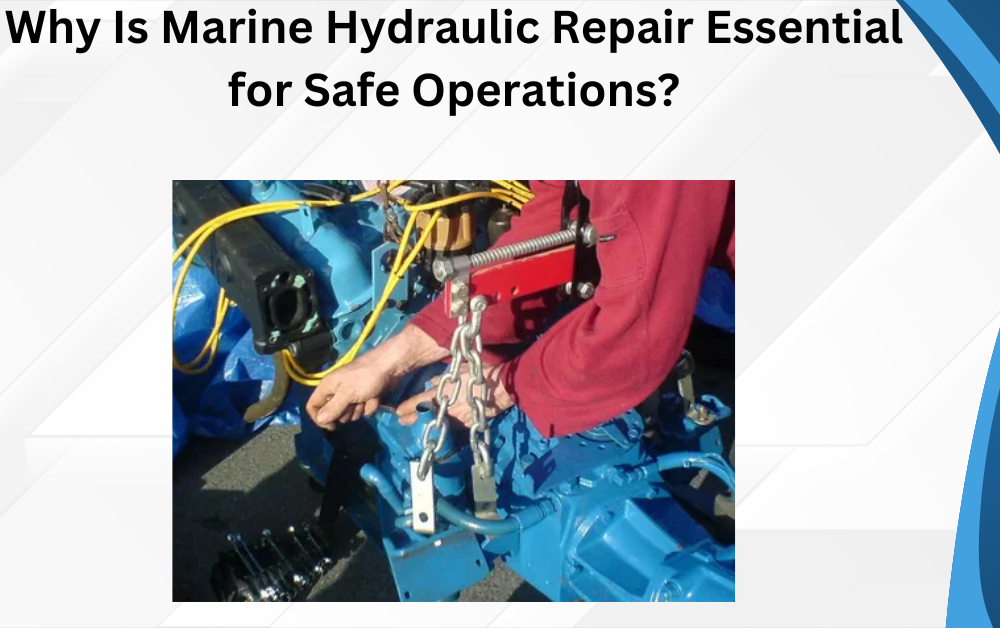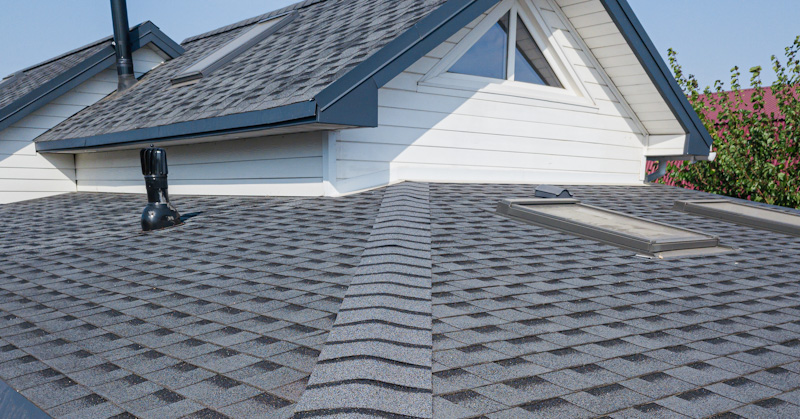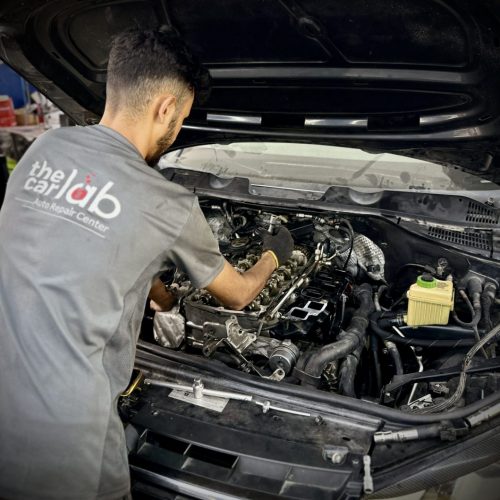Marine hydraulic systems play a critical role in the safe and efficient operation of ships, offshore platforms, and various maritime equipment. These systems power essential functions, such as steering, lifting, winching, and stabilizing, ensuring seamless performance at sea. Given the harsh marine environment, hydraulic components are exposed to extreme conditions, including saltwater corrosion, fluctuating temperatures, and high-pressure demands. Without proper maintenance and timely repairs, these systems are prone to failures, which can compromise operational safety and lead to costly downtime.
In this article, we will explore the significance of marine hydraulic repair, common hydraulic system issues, and best practices for maintaining these systems to ensure long-term reliability and safety in maritime operations.
The Role of Hydraulic Systems in Marine Operations
Hydraulic systems are widely used in marine applications due to their ability to generate high power while maintaining precise control. These systems enable critical operations on ships and offshore installations, making them indispensable in modern maritime industries.

How Marine Hydraulic Systems Function
Marine hydraulic systems use pressurized fluid to generate mechanical power. This power is used to operate essential equipment, such as rudders, cranes, cargo lifts, and propulsion systems. The key components of a marine hydraulic system include:
- Hydraulic Pumps – Generate fluid pressure for power transmission.
- Hydraulic Cylinders – Convert hydraulic energy into linear motion.
- Valves – Regulate pressure and fluid flow within the system.
- Hoses and Fittings – Transport hydraulic fluid between components.
- Hydraulic Fluid – Transfers energy and lubricates internal parts.
A properly maintained hydraulic system ensures smooth and reliable operation, but any failure in these components can lead to serious safety risks.
NOTE – Marine Hydraulic Repair has been instrumental in ensuring the efficiency and longevity of hydraulic systems in the marine industry. Power Hydraulics provided expert repair and maintenance services, helping maritime operators prevent costly failures, enhance equipment performance, and maintain compliance with safety regulations.
Common Issues in Marine Hydraulic Systems
Hydraulic systems in marine environments are exposed to several challenges that can impact their performance. Identifying these issues early is crucial for maintaining operational efficiency and safety.
Corrosion and Saltwater Damage
Saltwater is highly corrosive, and continuous exposure can lead to rust formation on hydraulic components. Corrosion weakens the integrity of metal parts, increasing the risk of failure. Protective coatings, regular maintenance, and corrosion-resistant materials help mitigate these effects.
Fluid Contamination and Leakage
Contaminants such as water, dirt, and metal particles can enter the hydraulic fluid, causing wear and tear on internal components. Contaminated fluid can clog filters, increase friction, and reduce system efficiency. Regular fluid analysis and filtration prevent contamination-related failures.
Seal and Hose Wear
Seals and hoses are critical for maintaining fluid pressure and preventing leaks. Over time, they degrade due to exposure to extreme temperatures and pressure fluctuations. Damaged seals and hoses can lead to fluid leaks, reducing system efficiency and increasing safety risks. Routine inspections and replacements are essential.
Pump and Valve Failures
Hydraulic pumps and valves control the flow of pressurized fluid. If these components fail, the system can experience erratic performance, sudden pressure drops, or complete failure. Regular testing and timely repairs help maintain their functionality.
Overheating and Pressure Instability
Excessive heat can damage hydraulic fluid, reducing its effectiveness. Overheating is often caused by clogged filters, excessive load, or insufficient lubrication. Monitoring temperature and pressure levels ensures the system operates within safe limits.
Why Marine Hydraulic Repair Is Essential for Safety
Routine repair and maintenance of hydraulic systems are essential to preventing catastrophic failures and ensuring the safety of maritime operations.
Preventing Equipment Failures
Failure of a hydraulic system during a critical operation—such as steering, cargo handling, or stabilizing—can lead to severe accidents or vessel instability. Timely repairs reduce the likelihood of mechanical failures and enhance reliability.
Enhancing Crew and Passenger Safety
A malfunctioning hydraulic system can pose significant risks to crew members and passengers. Sudden failures in winches, cranes, or other hydraulic-powered equipment can cause injuries or operational hazards. Regular inspections and repairs help maintain safe working conditions.
Reducing Downtime and Operational Delays
Unexpected hydraulic failures can disrupt shipping schedules and lead to costly downtime. Preventive maintenance and immediate repairs ensure vessels remain operational, reducing financial losses.
Extending the Lifespan of Hydraulic Components
Regular servicing and repairs help extend the lifespan of hydraulic components by addressing wear and tear before it escalates. This reduces the need for costly replacements and improves system longevity.
Ensuring Compliance with Safety Regulations
Marine industries must comply with strict safety and environmental regulations. Regular hydraulic system maintenance ensures compliance with international safety standards, avoiding legal and operational risks.
Best Practices for Marine Hydraulic Repair and Maintenance
To maximize the efficiency and safety of marine hydraulic systems, operators should adopt the following best practices:
Routine Inspections and Preventive Maintenance
Conducting scheduled inspections helps detect potential issues before they become serious. Regular maintenance includes checking fluid levels, inspecting seals, and testing system pressure.
Maintaining Hydraulic Fluid Quality
Contaminated or degraded hydraulic fluid can compromise system performance. Regularly changing and filtering hydraulic fluid ensures optimal functionality.
Replacing Worn Seals and Hoses
Seals and hoses should be inspected for cracks, leaks, and wear. Replacing them before failure prevents fluid loss and maintains system integrity.
Monitoring System Pressure and Temperature
Excessive pressure and heat can lead to hydraulic system damage. Monitoring these parameters and making necessary adjustments prevents premature wear and system failures.
Using Genuine Replacement Parts
Quality matters when replacing hydraulic components. Using certified and high-quality parts ensures the longevity and reliability of repairs.
Accessing Emergency Repair Services
Marine hydraulic failures can happen unexpectedly. Having access to reliable 24/7 emergency repair services helps minimize downtime and restore functionality quickly.
Choosing the Right Marine Hydraulic Repair Service
Selecting an experienced and reputable hydraulic repair provider is crucial for maintaining safe and efficient operations. Consider these factors when choosing a service provider:
Experience and Technical Expertise
Look for a company with extensive experience in marine hydraulic systems. Skilled technicians ensure accurate diagnostics and effective repairs.
Availability of High-Quality Spare Parts
A reliable service provider should offer certified hydraulic components and spare parts to guarantee long-lasting repairs.
Comprehensive Maintenance Plans
A provider offering preventive maintenance services, including fluid analysis and component testing, helps maintain system efficiency.
24/7 Emergency Services
Marine operations run continuously, making it essential to have access to round-the-clock repair services for unexpected failures.
Conclusion
Marine hydraulic repair is essential for ensuring safe, efficient, and reliable maritime operations. Regular maintenance and timely repairs prevent equipment failures, enhance crew safety, and reduce operational costs. Addressing issues such as corrosion, fluid contamination, and component wear ensures long-term system performance. By partnering with an experienced hydraulic repair provider, marine industries can ensure compliance with safety regulations and improve overall operational efficiency.
For More Insightful Articles Related to This Topic, Feel Free to Visit: viewsparrow







